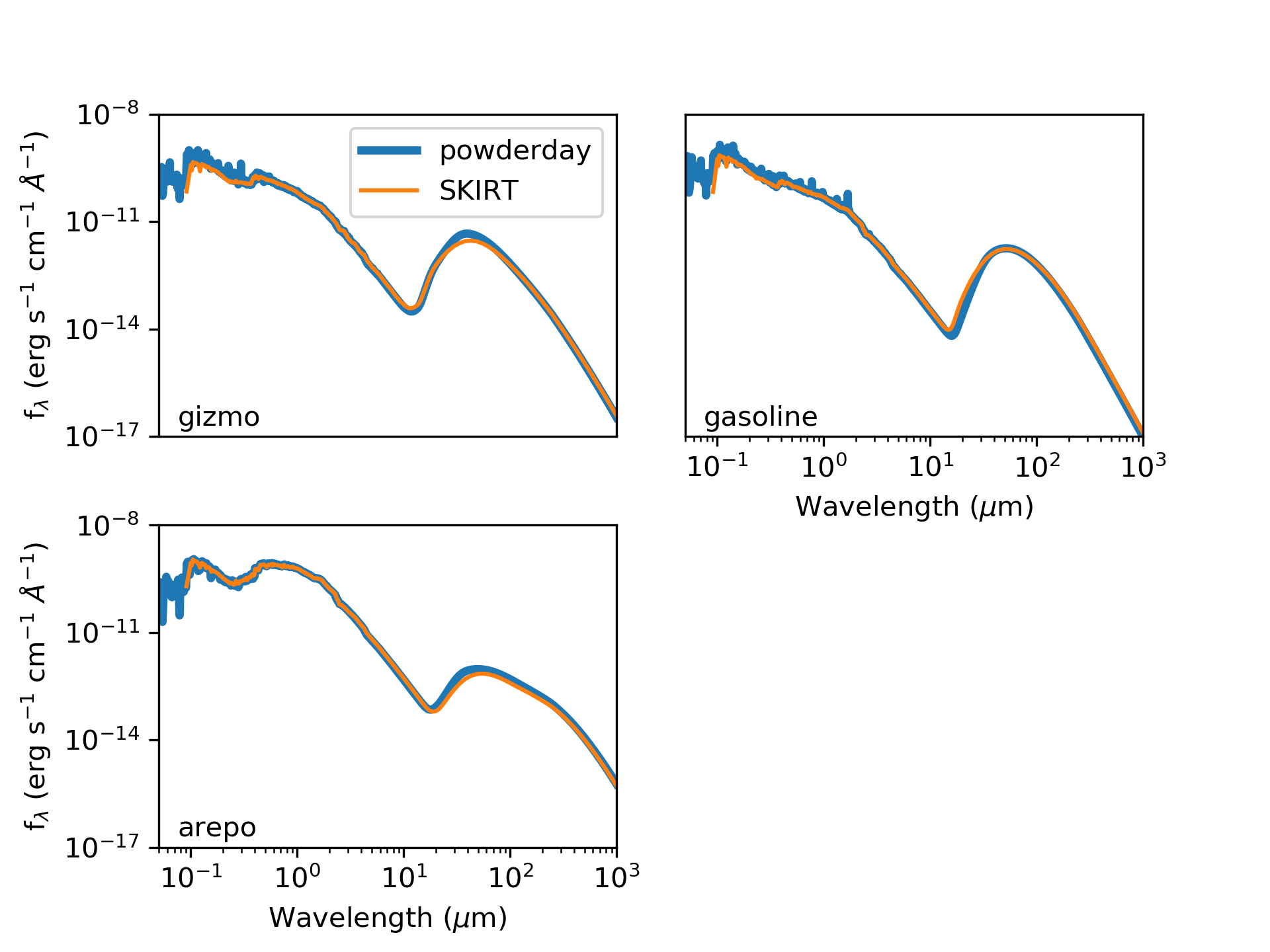Model Tests¶
Here, we describe some tests of the model. This growing suite of tests are packaged with the repository so that developers can examine the impact of any code updates.
SKIRT tests¶
| Relevant Hash: | The powderday hash for the most recent set of tests is 2fdf5e49074289382648a3be6a9478fcb9a0e84c and the relevant SKIRT hash is 96e8be9761c3021498b847854bf84c3da3129555. |
|---|---|
| Simulation Codes: | |
The tests done here have been done for Gizmo simulations, Gasoline/Changa simulations with a tipsy output format, and Arepo. Note, that the Arepo test that ship with the code are currently configured to be run with the radiative transfer on the Voronoi mesh in powderday, but on an octree grid in SKIRT. Pull requests very welcome from community experts on setting up the appropriate ski file for SKIRT with Voronoi mesh simulations. |
|
| Downloads: | The relevant
parameter files (the The hydrodynamic simulations for the test runs that ship with powderday aren’t included in the repository due to their size. The gizmo simulation is the same mufasa zoom simulation as in the Gadget/Gizmo quickstart section, and is available here. The Changa/Gasoline/Tipsy output is galaxy_00300 from the public yt datasets page |
Actually Running the Tests: Powderday:¶
In what follows, we lead the user through the tests for a Gizmo type simulation, though the process for testing the tipsy outputs is similar.
To run the powderday test code, run:
pd_front_end.py tests/SKIRT/gizmo_mw_zoom parameters_master_gizmo parameters_model_gizmo
After having edited the parameters_master and parameters_model
file for your specific paths.
Actually Running the Tests: SKIRT:¶
SKIRT needs to know
the stellar and gas particle information from the hydrodynamic
simulation. In `analytics.py, there’s a function
SKIRT_data_dump() that dumps these files to your powderday output directory. Here, it should have dumped files with a path like:
tests/SKIRT/gizmo_mw_zoom/SKIRT.134.gas.particles.txt
SKIRT also requires an
input parameter file which can be created via a terminal input
following their tutorials. We have created the .ski input file:
tests/SKIRT/pd_test.dust.ski
SKIRT requires paths relative to the run directory. After compiling SKIRT, one possible setup might be:
cd SKIRT/run
mkdir pd_test
cp <path_to_powderday>/tests/SKIRT/pd_test.dust.ski pd_test
../release/SKIRT/main/skirt pd_test/pd_test.dust.ski
In the run directory, this should create a file like:
/home/desika.narayanan/SKIRT/run/test_i90_sed.dat. This has
chosen one particular viewing angle (which, in fact may not be the
same viewing angle as the powderday simulation - in fact it was
arbitrarily chosen). Then you can run:
cd <path_to_powderday>
python tests/SKIRT/skirt_sed_plot.py
and it should produce an image like the top left one in:

Note, there are analagous tests for the arepo and gasoline/changa front ends that ship with powderday as well that will produce the other panels in the aforementioned code comparison figure.
Persistent Differences in the Models¶
While we have attempted to ensure as much of an apples-to-apples comparison between codes, some differences are persistent that manifest themselves in the emergent SEDs.
The input SEDs are different, as is evident in the UV portion of the comparisons. The former employ interpolated BC03 stellar models at a lower resolution than the input MILES spectral libraries for the fsps models that powderday employs.